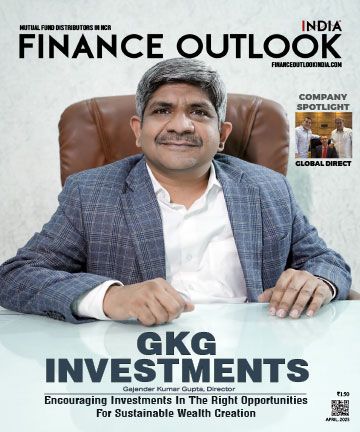Zakhil Suresh, Founder & CEO of BitSave and a veteran in the cryptocurrency industry, brings a wealth of expertise deeply rooted in the realm of finance. His journey began during his CA internship in 2014, where his early encounters with Bitcoin sparked a profound interest in cryptocurrencies. Recognizing an untapped niche in the market, Zakhil and his peers pioneered a brokerage platform focused on Ethereum amidst a landscape dominated by Bitcoin in 2017. This venture evolved into strategic involvement with emerging exchanges like Koinex, which swiftly rose to prominence. Despite regulatory challenges leading to the closure of Koinex in 2019, Zakhil persisted in the crypto space, transitioning to full-time trading and later conceptualizing BitSave in 2022. At BitSave, he has introduced a robust index-based investment platform, leveraging Bloomberg's renowned crypto index to offer investors a safe and simplified entry into digital assets.
Navigating Opportunities and Challenges in Crypto Markets
In assessing today's cryptocurrency landscape, Zakhil brings a seasoned trader's perspective enriched by years of deep industry involvement. He acknowledges the inherent volatility that characterizes crypto trading, emphasizing its allure to both novice and seasoned traders alike. "Volatility is the biggest friend of a trader," remarks Zakhil, highlighting how market movements enable profit opportunities that are not present in stable markets.
From a technical standpoint, Zakhil underscores how crypto's volatility attracts short-term traders seeking rapid returns. This volatility, he explains, allows traders to potentially amplify gains with relatively modest investments, appealing to those hungry for quick financial results. Furthermore, he observes significant trends rooted in cryptocurrency's historical cycles, particularly noting Bitcoin's four-year halving period. These events historically mark a recovery phase, often preceding substantial market upticks. "The recent halving has sparked bullish sentiments," highlights Zakhil, pointing towards a renewed trader interest and increased market participation as indicators of a potential upcoming bullish cycle.
Furthermore, Zakhil signifies the dichotomy between technical and fundamental perspectives within the crypto market. While volatility appeals to short-term traders, broader market trends and historical patterns like halving events inform strategic investment decisions. As the industry evolves amid regulatory developments, Zakhil remains optimistic about the opportunities present, driven by ongoing market dynamism and evolving investor sentiments.
Evolving Regulatory Landscape and Technological Trends in Cryptocurrency
Reflecting on recent developments in the cryptocurrency market, Zakhil, explores pivotal factors shaping its trajectory. From a regulatory standpoint, he notifies significant strides towards clarity and acceptance globally. Countries like UAE, Singapore, Thailand, and Indonesia have embraced crypto regulations, fostering a conducive environment for both institutional and retail investors. In India, recent guidelines on taxation, reporting, and AML compliance provide further legitimacy to the industry; thereby encouraging broader participation.
Zakhil further showcases the impact of regulatory clarity on market dynamics, particularly citing the surge in institutional interest post-ETF approvals. The introduction of regulated investment vehicles has instilled confidence among investors seeking security and compliance standards akin to traditional markets. This regulatory evolution, Zakhil believes, has been instrumental in the recent bullish trends, exemplified by Bitcoin's record highs following increased institutional participation.
If we speak from the technological standpoint, Zakhil underscores the burgeoning trend of asset tokenization as a transformative force. Institutions like Blackrock embracing public blockchains such as Ethereum signal a paradigm shift towards transparency and security in asset management. This trend towards tokenizing real-world assets is gaining traction, attracting investor attention and driving market innovations. Additionally, looking at the industry from a macroeconomic perspective, Zakhil identifies cryptocurrency, particularly
Bitcoin, as an inflation hedge amidst global economic uncertainties. For instance, countries grappling with high inflation rates, like Argentina and Turkey, illustrate the utility of cryptocurrencies as alternative stores of value. Conversely, stable economic conditions in regions like India underscore different adoption drivers, such as high-return potential alternative investments rather than inflation mitigation.
Zakhil emphasizes the dynamic interplay of regulatory developments, technological advancements, and macroeconomic conditions in shaping the crypto landscape. As cryptocurrencies continue to evolve beyond speculative assets into viable investment and utility-driven tools, Zakhil remains optimistic about their transformative potential in global finance.
Unearthing India's Curious Crypto Market
If we assess the current state of India's cryptocurrency market, Zakhil sheds light on key challenges and opportunities. Central to these is the pervasive lack of awareness and regulatory clarity, which perpetuates misconceptions about the legality of crypto investments. Zakhil underscores the responsibility of industry players to educate and dispel myths, emphasizing that while crypto is unregulated, it remains legal to invest in and report taxes on gains.
Furthermore, a significant hurdle highlighted by Zakhil is the taxation regime, particularly the 30 percent flat tax on profits and the 1 percent TDS, which has dampened trading volumes. Despite this, Zakhil points out that crypto assets like Bitcoin have historically delivered substantial returns, even post-tax, making them attractive within diversified portfolios.
Additionally from a regulatory perspective, Zakhil further acknowledges India's cautious approach, particularly in restricting crypto from becoming part of the formal payment system. This stance aims to mitigate risks associated with capital controls and ensure financial stability. While regulatory clarity is evolving, Zakhil stresses the need for comprehensive guidelines to protect investors and foster industry growth.
Here, Zakhil advises investors to approach crypto as a strategic asset allocation, recommending a modest one to five percent portfolio allocation to manage risks associated with volatility and regulatory uncertainties. He cautions against overexposure driven by market hype, advocating for informed decision-making and adherence to legitimate platforms.
Adding to this, Zakhil also highlights the transformative potential of asset tokenization, citing its transparency and security benefits. However, he also addresses the proliferation of fraudulent platforms targeting unsuspecting investors, which tarnish crypto's reputation. He urges vigilance and due diligence among investors to safeguard against scams and maintain the credibility of digital assets.
So to say, Zakhil maintains optimism about India's crypto market, foreseeing gradual regulatory clarity and increased adoption with global coordination. He advises investors to stay informed, exercise caution, and engage with credible platforms to navigate the complexities and seize opportunities within this evolving ecosystem. Zakhil continues to be an advocate for responsible crypto investment practices, aiming to build trust and facilitate secure participation in India's burgeoning digital economy. His insights serve as a guiding light amid regulatory uncertainties, encouraging a balanced approach to harnessing the potential of cryptocurrencies.
Future Prospects: Promoting Long-Term Market Stability
Discussing strategies for achieving long-term stability in the cryptocurrency market, Zakhil, highlights institutional adoption as a pivotal factor. He argues that institutional involvement can mitigate volatility by deepening liquidity and stabilizing order books. Unlike traditional assets that typically see institutional entry first, crypto has evolved from retail origins, democratizing investment access.
Zakhil emphasizes that increased institutional participation, particularly in major assets like Bitcoin and Ethereum, will bolster market resilience. This trend, observed over years, has already shown signs of decreasing volatility as more substantial investments and long-term commitments enter the scene. While acknowledging the current normalization of meme tokens and speculative trading, Zakhil distinguishes them from established assets with institutional backing. He believes that assets with robust institutional frameworks, such as ETFs, will naturally experience reduced volatility and improved liquidity conditions over time.
However, Zakhil speaks of persisting challenges such as liquidity constraints, particularly evident in executing large orders efficiently across exchanges. Here, he anticipates these issues to diminish with broader participation from both active traders and long-term investors, further fostering healthier market dynamics.
Going forward, Zakhil anticipates regulatory frameworks, similar to those in UAE and Bahrain, to guide and stabilize the industry further. Such regulations are crucial for ensuring market integrity and investor protection, potentially fostering a more secure and conducive environment for crypto investments globally. He also underscores the transformative potential of institutional involvement in crypto, predicting that as these entities continue to enter the market, volatility will decrease, liquidity will improve, and investor confidence will grow. His insights reflect a balanced approach towards fostering stability amidst the evolving landscape of digital assets.
Zakhil continues to be an advocate for responsible crypto investment practices, aiming to build trust and facilitate secure participation in today’s burgeoning digital economy!


